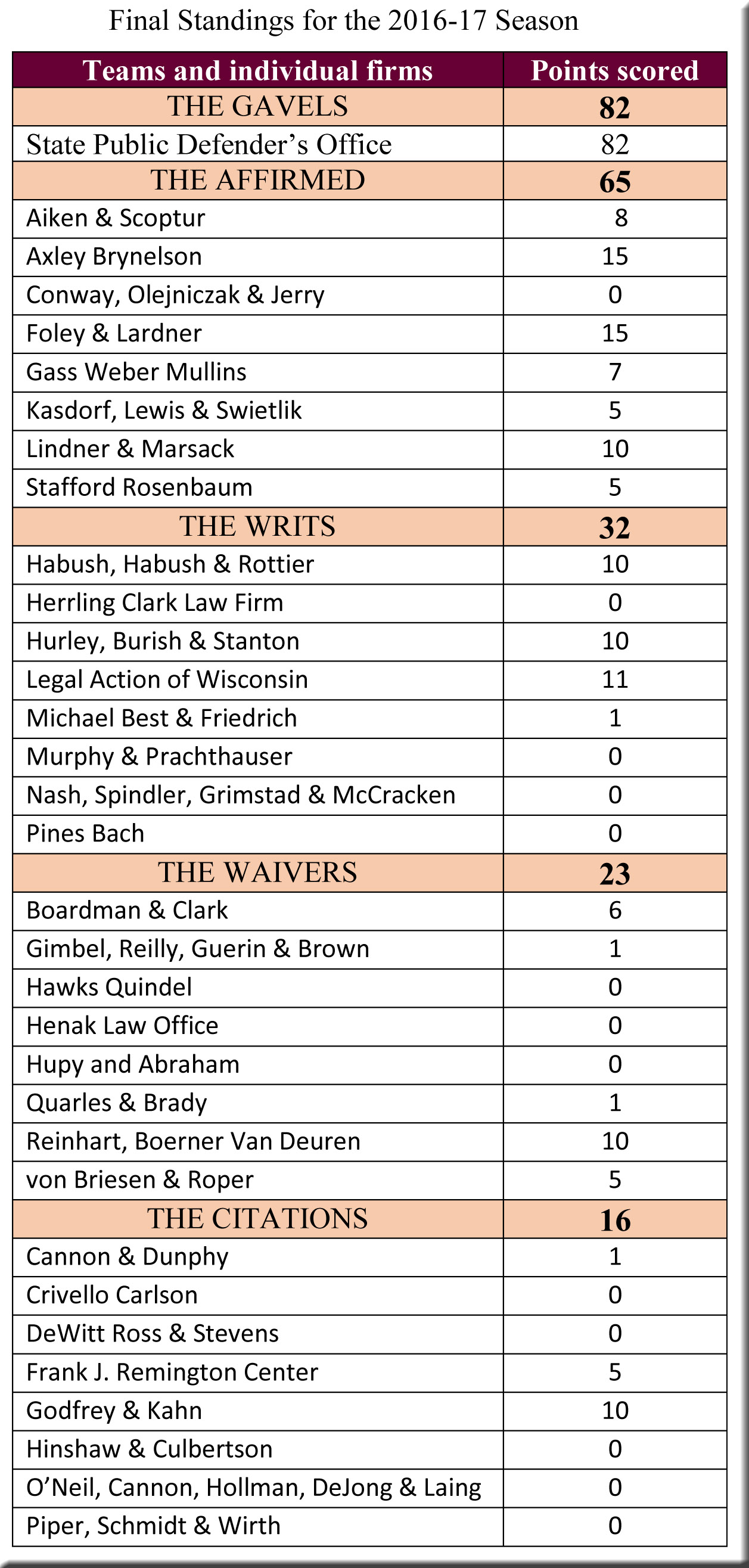Now that the raucous merriment has subsided following last weekend’s Second Annual Awards Banquet, it’s time to post the season’s final reckoning—and summarize the evening’s highlights for those unable to attend the gala. For the second year in a row, the Gavels of the State Public Defender’s Office hoisted the Commissioner’s Trophy as league champions, and attorney Kaitlin Lamb was honored as the league’s MVP. This award is only bestowed in years when an individual clearly stands out among the members of a victorious team—as did attorney Lamb, who delivered three oral arguments and contributed 20 points to the Gavels. No other member of the Gavels argued more than one case, except for Joe Ehmann, who had two oral arguments in connection with amicus briefs (for a total of four points).
Several individual firms on other teams also turned in impressive performances, as displayed in the following table. For the second year in a row the Affirmed finished in second place, and this year their total of 65 points more than doubled the scores of any of the other three teams. Axley Brynelson and Foley & Lardner each garnered 15 points for the Affirmed—nearly half the team’s total, though all but one of the team’s other members also contributed at least five points.
Firms that delivered nothing to their teams, especially if they were also dormant during the 2015-16 season, will face scrutiny by the Selection Committee during its winter meeting. Some may be relegated to the Developmental League in order to clear roster spots for firms that have been active recently in the Supreme Court, thereby earning call-ups for the 2017-18 season.

So, you don’t get any points for filing an amicus brief in support of a pro se petition for review that results in a confession of error by the state and a summary reversal? State v. Jerry Simone Wilson, Appeal No. 2013AP2590:
OCCD SC 09-21-2016
Petition for Review
Filed By: Jerry Wilson
Submit Date: 9-23-2016
Decision: (G) Grant
Decision Date: 2-15-2017
ORD that the petition for review is granted; and
FRO that this court hereby summarily reverses that portion of the court of appeals’ decision affirming that part of the circuit court’s order denying Mr. Wilson’s newly discovered evidence claim without an evidentiary hearing; and
FRO that the matter is remanded to the Milwaukee County Circuit Court for further proceedings in light of the State’s concession that Mr. Wilson is entitled to an evidentiary hearing on his newly discovered evidence claim; and
FRO that the proceedings in this court are held in abeyance during the pendency of the remand, and that this court retains jurisdiction over the issues raised in the petition for review while the circuit court conducts proceedings on remand. The parties are instructed to inform this court of both: (1) the outcome of the remand; and (2) how that outcome impacts the issues raised in the petition for review.
Motion Response
Filed By: Robert Henak
Submit Date: 10-11-2016
Motion Response
Filed By: Jeffrey Kassel
Submit Date: 1-25-2017
Comment: 10/11/16 – Brief in support of petitoner filed by Wis. Assoc. of Criminal Defense Lawyers
This is a fair point—indeed, one could easily argue that this particular amicus brief was more successful than many of those filed later in the process, after a case has been accepted for Supreme Court review. However, I had to draw the line somewhere in order to make administration of the fantasy league manageable, and thus I don’t award points to law firms that file petitions for review or amicus briefs in support of petitions for review. Scoring is limited to briefs and oral arguments that materialize after the court has accepted the case for review.
It has been brought to my attention that Joe Ehmann should be credited with an extra point for delivering an oral argument associated with his amicus brief in State v. Zimbal (the title page of which does not list him as participating in the oral argument—unlike the title page of State v. Suriano, which lists him, correctly, as filing an amicus brief and delivering oral argument). I am grateful to readers for alerting me to such errors, and I have made the necessary corrections to the post.